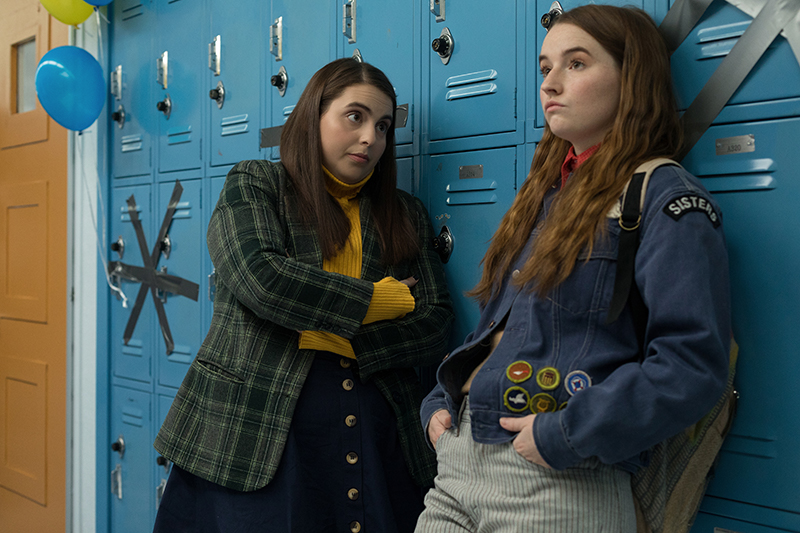Booksmart

Beanie Feldstein stars as Molly and Kaitlyn Dever as Amy in Olivia Wilde’s directorial debut, BOOKSMART, an Annapurna Pictures release. Credit: Francois Duhamel / Annapurna Pictures

Like Molly (Beanie Feldstein) and Amy (Kaitlyn Dever), the protagonists in Olivia Wilde’s teen comedy BOOKSMART, I went to just one party in high school. What struck me, contrary to most cinematic treatments, is that nobody there was out to get me, the class nerd. Off the clock, there’s no one to impress in an attempt to assuage one’s own insecurities. Maybe this isn’t how every party plays out, but it’s a side of teen life that was better understood by Amy Heckerling than John Hughes. Whether jock, stoner, lode or dweeb, everyone’s cards are on the table because nobody that stoned or drunk is in control of their own narrative. Maybe it’s because school has a territorial effect. Maybe it’s because authoritarian teachers and administrators wittingly or unwittingly create a tense environment that brings out the worst social dynamics…. There’s a reason “office politics” is a dirty phrase.
Having realized that most of their classmates are university-bound to prestigious schools, Molly and Amy resolve to remedy four years of academic asceticism in one night of bacchanalian excess. In matching outfits, they stage their own pub crawl (or pub Uber, rather), hopping from party to party, descending into irreverence along the way—teens who did things with Barbies the manufacturer never intended, there’s a scene especially for you. If this sounds familiar, it’s a framework immortalized by Amy Heckerling, whose films FAST TIMES AT RIDGEMONT HIGH and CLUELESS were inspirations for director Olivia Wilde.
However, those movies stand out from the glut of teen comedies for the intelligence and agency bestowed upon their principals. What results is a movie in which the plot of self-discovery arises from other means than a cycle of victimization and revenge. When they do inevitably surpass all obstacles and distractions, to arrive at the intended party, no one harangues them and the conflict arises out of a misunderstanding. Misunderstandings are common, sometimes too common. Three’s Company comes to mind, but I digress.
This isn’t to say the story or characters are flawless. The movie leans a little too much on male homosexuality for comic effect. While not necessarily exalting or titillating with female homosexuality, the film doesn’t similarly caricature its gay, young women. And the emotional climax rests on a cliche: the best friends’ heart ripped out by the crush she eyes cavorting with someone else. And the film has no comment, save for one shot of Molly’s parents’ dilapidated apartment, about how the affluent students party every day and still manage to get into Harvard.
That said, none of the characters bears any true malice toward one another. The plot turns on the eccentricities of each. Lightly riffing off Tracy Flick (Reese Witherspoon) in ELECTION, Beanie Feldstein’s Molly is the intense leader, whose unhinged side surfaces upon her revelation that their peers have a life. Cast opposite Kaitlyn Dever’s “straight man”, tension foments between the former’s headstrong demands and the latter’s trepidation. When the inevitable, third act rift erupts, the glow of smartphone camera lights just out of focus, we get the feeling something horrible happens next. Instead, everyone moves on as quickly as the modern news cycle. Adversarial restroom gossip doesn’t revolve around traditional body shaming jokes. Molly’s enemies might enjoy being friends if only she weren’t so wound up. A few drinks and controlled substances later, everybody’s walls come down.
An admirer, Jared (Skyler Gisondo resembling a young clone of Simon Baker) and his almost muse, Gigi (Billie Lourd channeling Carrie Fisher’s one-woman stage show), seem at first to be the obnoxious rich kids. In this Peanuts strip-like world, where parents are conspicuously absent, one feels that these two occupy themselves with odd pursuits as a hedge against loneliness. Jared admits as much, expressing interest in aerospace design as an investment vehicle funding original musicals–an aspiration about as original as it gets. Gigi doesn’t say so, but we think she has the chops to be a script doctor.
Even the crush (Mason Gooding) who unknowingly betrays Molly oddly endears himself to us. Almost everyone does, in some form or fashion. If this story were set twenty years ago, I might not find that believable. Many of my peers kids’ graduate high school this year. It’s very evident that social dynamics evolved in the age of social media. Many films deal with how this takes bullying to another level. BOOKSMART examines the positives. Parents’ concerns today revolve around whether their children have enough maturity to navigate social situations enhanced by the immediacy of information exchange. If any of this film rings true, they’ve much reason to be proud. Social media united the marginalized among them, creating support networks that never existed in my high school days.
Editorials abound telling us that social media isolates, that it threatens to rip the fabric of society. That’s what it does in our hands. But if kids like Amy and Molly can discover truths about their peers, each other, and themselves, perhaps there’s hope for us yet.
Footnote: I’m well aware that the producer, director, and many of the actors come from Hollywood pedigrees or otherwise affluent families. But kids don’t choose their circumstances. They do choose what they do with that kind of power and influence. Suffice it to say that BOOKSMART and the Fyre Festival lie at opposite ends of that spectrum of possibilities.